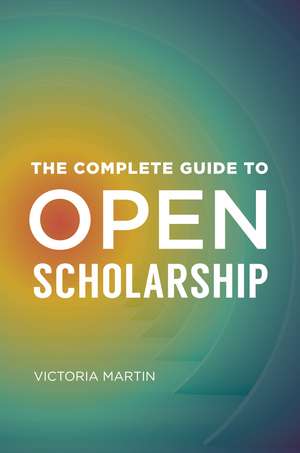The Complete Guide to Open Scholarship
Autor Victoria Martinen Limba Engleză Paperback – 23 mai 2022 – vârsta până la 17 ani
Preț: 386.49 lei
Preț vechi: 434.26 lei
-11% Nou
Puncte Express: 580
Preț estimativ în valută:
73.95€ • 77.06$ • 61.23£
73.95€ • 77.06$ • 61.23£
Carte tipărită la comandă
Livrare economică 03-17 aprilie
Preluare comenzi: 021 569.72.76
Specificații
ISBN-13: 9781440872808
ISBN-10: 1440872805
Pagini: 220
Dimensiuni: 156 x 235 mm
Greutate: 0.36 kg
Editura: Bloomsbury Publishing
Colecția Libraries Unlimited
Locul publicării:New York, United States
ISBN-10: 1440872805
Pagini: 220
Dimensiuni: 156 x 235 mm
Greutate: 0.36 kg
Editura: Bloomsbury Publishing
Colecția Libraries Unlimited
Locul publicării:New York, United States
Caracteristici
Shows how openness fits into the full life cycle of scholarship, from idea creation to data collection and the distribution of final research results
Notă biografică
Victoria Martin is a librarian with more than 18 years of professional experience in academic librarianship.
Cuprins
PrefaceAcknowledgmentsAcronymsChapter 1One Term, Many Meanings: Interpreting Openness in ScholarshipOpenness as TransparencyOpenness as a Scientific NormOpenness as an Ethical ObligationOpenness as Freedom of InquiryOpenness as Freedom from CostOpenness as an Author's RightOpenness as a User's RightOpenness as a MindsetOpenness as a Technological AdvancementChapter 2The Free Software Movement and the Open Source Initiative: Unlocking the Source CodeThe Free Software MovementThe Open Source InitiativeAdvantages and Challenges of Free Software and Open Source SoftwareChapter 3Open Content Licensing: Filling the Gap Between "All Rights Reserved" and "No Rights Reserved"Defining an Open Content LicenseKey Open Content LicensesMisconceptions about Open Content Licensing and CopyrightBenefits and Drawbacks of Open Content LicensingChapter 4Open Access (OA): Redefining Scholarly PublishingThe Budapest Open Access InitiativeThe Bethesda Statement on Open Access PublishingThe Berlin Declaration on Open Access to Knowledge in the Sciences and HumanitiesMain Strategies for Attaining OAOA and CopyrightOA and Peer ReviewOA Policies and MandatesOA BenefitsOA ChallengesOA and Predatory PublishingChapter 5Open Educational Resources (OER): Linking Openness and EducationEnvisioning Openness in EducationDefining OERArguments for OERThe OER MovementChallenges to a Wider Adoption of OEROER QualityTypes of OER ProjectsSustainability of OER ProjectsChapter 6Open Data: Facilitating Replication and Verification of Research FindingsWhat Are Open Data?Open Data PrinciplesOpen Data Policies and MandatesOpen Government DataJournal Data Sharing PoliciesOpen Data RepositoriesLicensing Open DataDedicating Data to the Public DomainBarriers to Data Sharing and ReuseChapter 7Citizen Science (CS): Transcending the Boundaries between Professional and Nonprofessional ScienceWhat Is Citizen Science?A Brief History and Current State of CSBenefits of CSChallenges of CSTypes of CS ProjectsChapter 8The Many Paths to Openness: Expanding the Sphere of Open ScholarshipOpen Peer ReviewInvisible CollegesAltmetricsOnline Author IdentifiersTransdisciplinarityConclusionGlossaryReferencesIndex
Recenzii
Informative, accessible, and pleasant to read, 'The Complete Guide to Open Scholarship' is a worthy addition to the collections of students and faculty, but above all academic librarians.
Highly recommended. General readers through faculty; professionals.
Victoria Martin has done an admirable job of teasing apart the tangled conceptual threads of "openness" and laying them out in a clear and logical manner, while even-handedly considering both its costs and its benefits. This book will be a boon to anyone who wants to understand the complex landscape of open scholarship.
Highly recommended. General readers through faculty; professionals.
Victoria Martin has done an admirable job of teasing apart the tangled conceptual threads of "openness" and laying them out in a clear and logical manner, while even-handedly considering both its costs and its benefits. This book will be a boon to anyone who wants to understand the complex landscape of open scholarship.
